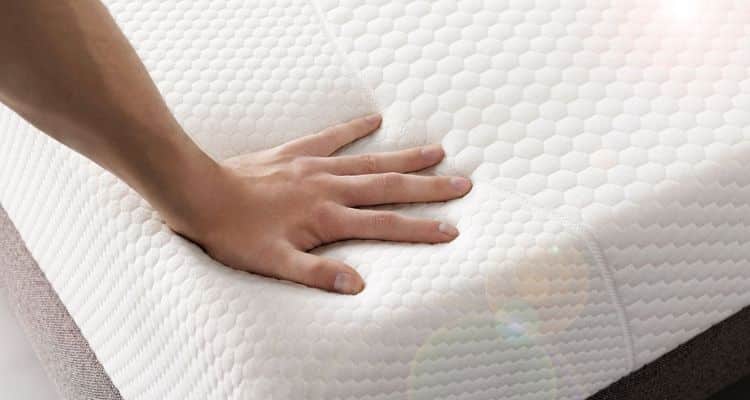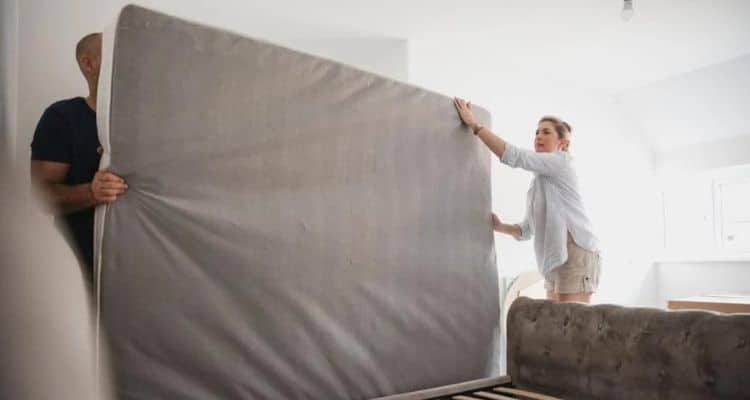Are you tired of waking up with body aches and having sleepless nights? Don’t worry because it’s not your fault; it’s just your mattress that has failed to achieve its goal. Those tense muscles hinder your sleep and create resistance in your sweet dreams.
After all the laborious chores and all day at work, you wish to have a foamy mattress that will make you fall asleep peacefully. Suppose your comfy mattress has not been able to perform well; this is the time to replace it with a new one (check 10 amazing mattresses on the market).
What Factors Make Your Mattress Last Longer?
You undoubtedly want it to last when you spend significant money on a mattress. You must desire the greatest possible comfort from your mattress. The chosen material and quality control will determine its longevity. Latex mattresses last the longest than any other.

Your sleeping posture and weight surely have an impact. Heavy or side sleepers encourage premature sagging (check 10 amazing mattresses for overweight people). If you use a certain area of the mattress regularly, signs of wear and tear are inevitable at that point and affect sleep quality. Most importantly, cleanliness and protection are other added pointers.
How To Extend the Life of Your Current Mattress?
Ensure you follow all the manufacturer’s guidelines to enjoy the luxury and comfort of your mattress. You surely don’t want to miss any important instructions. Clean and maintain hygiene and change the bed sheets routinely. Use mattress protectors to protect it from dust, stains, and spills.
Try using a good foundation that matches your mattress (also check 10 great mattresses for adjustable bed). It will save the mattress edges and will extend its life more.
If your mattress is compatible, try flipping or rotating your mattress from time to time. This way, you can avoid straining any specific muscle and prevent wear and tear.
How Do You Know When Your Mattress Needs Replacing?
The majority of mattresses are reliable for 7–10 years. After this lifespan, you might not experience the same level of relaxation that you usually do while curled up in bed. You become cranky after restless nights and exhausting days. The serenity and comfort you experienced when your mattress was new are gone.
Visible signs of sagging and deterioration mean your body is left unsupported. This can seriously aggravate any back pain since the normal alignment is lost. The continuous and rapid wear and tear will harm your mattress and reduce its lifespan.
If no health issues are suspected, being irritable during your slumber and waking up with aches and soreness. It’s a call for change.
You might want to check the condition of your mattress to see if your allergies are returning or getting severe. Mattresses, over time, build up dirt and dust mites. They irritate your respiratory passageways, making your sleep uncomfortable (also check the best selling bed sheets for allergies).
The worst-case scenario is if your mattress is noisy. After a certain period, the inner springs start to degrade. Every time someone gets into bed with you, their movement is significantly more noticeable (check the top-quality mattresses for couples).
Moreover, if your mattress is creating a sleep of choice, the results you want to achieve are becoming your biggest struggle. Other mattresses attract you more such as mattresses in the hotel room.
Why Do Different Mattresses Have Different Levels Of Durability?
The mattress’s durability will be greatly influenced by the materials used in its manufacturing.
The longevity of your mattress will be affected by the quality of the mattress when you first purchased it. Cheap mattresses frequently degrade more quickly than expensive hybrids (check the best selling hybrid mattresses). Mattress Latex and high-density polyfoam materials survive longer than low-density ones.
Another consideration is the kind of mattress. High-density memory foam or polyfoam beds last the longest, next to latex mattresses. Beds made of lower-density foam and hybrid types degrade a little more quickly. The shortest anticipated lifespan is typically associated with traditional innerspring mattresses.
Mattress thickness is important. For instance, foam layers are present in slim mattresses, enhancing their comfort and toughness. They are a better option for people who do not want thick mattresses.
The foundation layer also influences mattress durability. A thick foundation layer minimizes mattress sinking. Conversely, thicker base layer mattresses are often more durable.
All these factors can affect the mattress’s durability. So, protect your mattress as much as possible so it can be your pet forever before it ages.
How Often Should You Replace Your Memory Foam Mattress?

A memory foam mattress relieves pressure points and contours the body in every sleep position (check 10 top rated mattresses for stomach sleepers). You may experience restless nights and pain in most of your body’s sensitive areas, including the hip region. They often last for 10–13 years if you take good care.
What’s The Best Time to Replace Your Latex Mattress?
You will be surprised that latex mattresses usually last 10–20 years. It’s a big deal for people who always hesitate to buy frequently or don’t want to burden their pockets. Always check for the sales and discount options on different brands for a good budget-friendly. Have an eye on your latex mattress.
How Often Should You Replace Your Hybrid Mattress?
On average, they live between six and seven and a half years, though they can last longer with proper care. Not to worry more, because there is a tip to increase its longevity. You need to rotate it every 3 to 6 months to lengthen its durability. I hope this helps out in your case. If that is not the case, replace it with a new hybrid and enjoy its comfort.
How Often Should You Replace Your Innerspring Mattress?
Innerspring mattresses are great for adding extra comfort to your sleep. They are breathable and allow you to sleep cool throughout the night. Innerspring mattresses typically last 5-6 years. But with time, it will lose its ability to meet your demand. Replace it immediately if you hear the noisy sound of the springs, sagginess, or wake up with stiff joints.
When Should You Replace Your Orthopedic Mattress?
Orthopedic mattresses guarantee proper spinal alignment. It relieves pressure on the spine and reduces back pain (check 10 amazing mattresses for back pain). However, as it ages, you will notice its signs of wear and tear. You will be suffering again from discomfort due to your aching spine.
If you wake up with stiff muscles in your body, it hinders staying active all day. If all these things are visible to your naked eye, quickly rush to your nearest mattress store and buy a new one.
What are early signs I may need a new mattress?
Early signs include:
- Waking up with aches and pains or feeling tired
- Visible sagging, cracks, or tears in the mattress
- Impressions or deep body indentations in the mattress surface
- Noticeable loss of support and comfort
- You sleep better in other beds like hotels or friends’ houses
Is it better to replace or add a mattress topper?
It depends on the condition of your current mattress. If it is still in relatively good condition with some slight sagging, a quality mattress topper can extend its life. But if there are major sags, damage, or loss of support, it’s best to replace the entire mattress.
Conclusion
You are digging your grave if you are stingy and don’t want to buy a new mattress because of its high cost (also check 10 best selling mattresses under $1,000). Enhanced vertebral problems, especially severe pain in the neck and back regions. Soon you will be a victim of many other metabolic diseases.
A perfect mattress that amazes in its comfort level for a good sleep so that you can sleep soundly and wake up feeling refreshed. It’s a one-time purchase. After that, you will be relieved for years to come and will be able to continue enjoying the relaxing and nourishing sleep.
Look at its signs as it starts aging or when it calls for a change. Make sure to replace it before it’s too late.
Mattress replacement FAQs
What Happens to A Mattress After 10 Years?
After 10 days, visible signs of wear and tear are seen. It fails to provide you with comfort and good sleep. Tons of sweat, smelly dead skin, and dust mites gather inside an old mattress.
Can I Keep the Mattress For 15 Years?
Yes, you can keep them for this much period. If your mattress is from a high-end brand that guarantees its durability, you should consider yourself lucky. A mattress deteriorates with time and reduces its capability to perform well.
What Is the Longest-Lasting Mattress?
On average, the mattress can last for 10- 12 years.
How Do You Know When Your Mattress Needs Replacing?
The key to a good night's sleep is your mattress. Replace your mattress as soon as you experience sleepless nights, severe body aches, and signs of sagging and foam damage.

